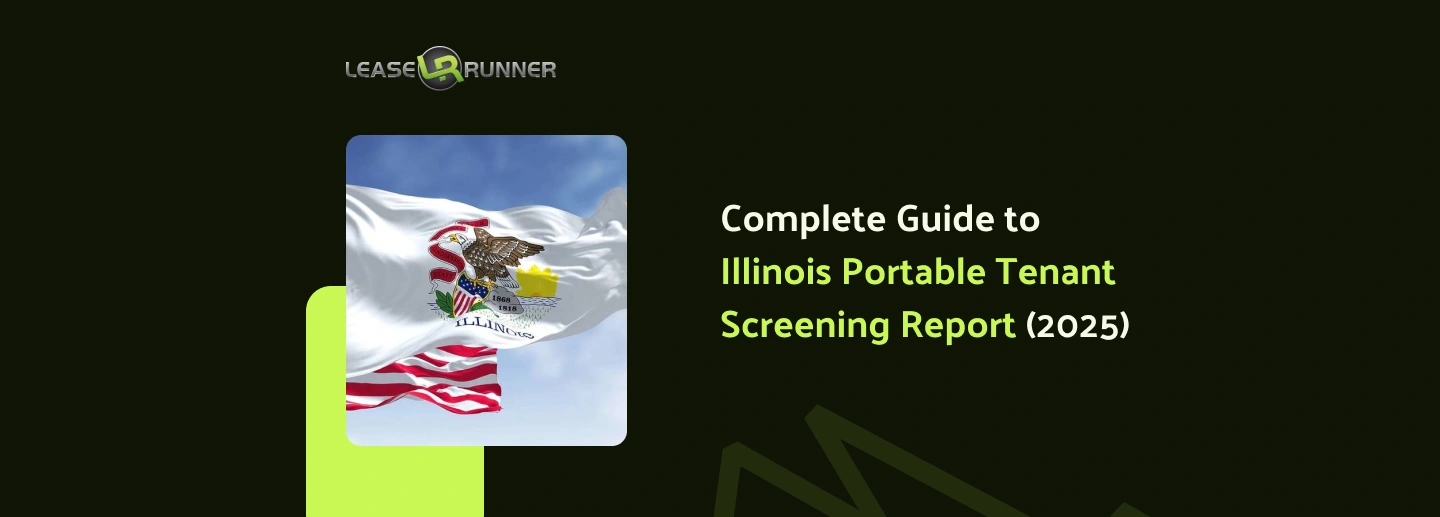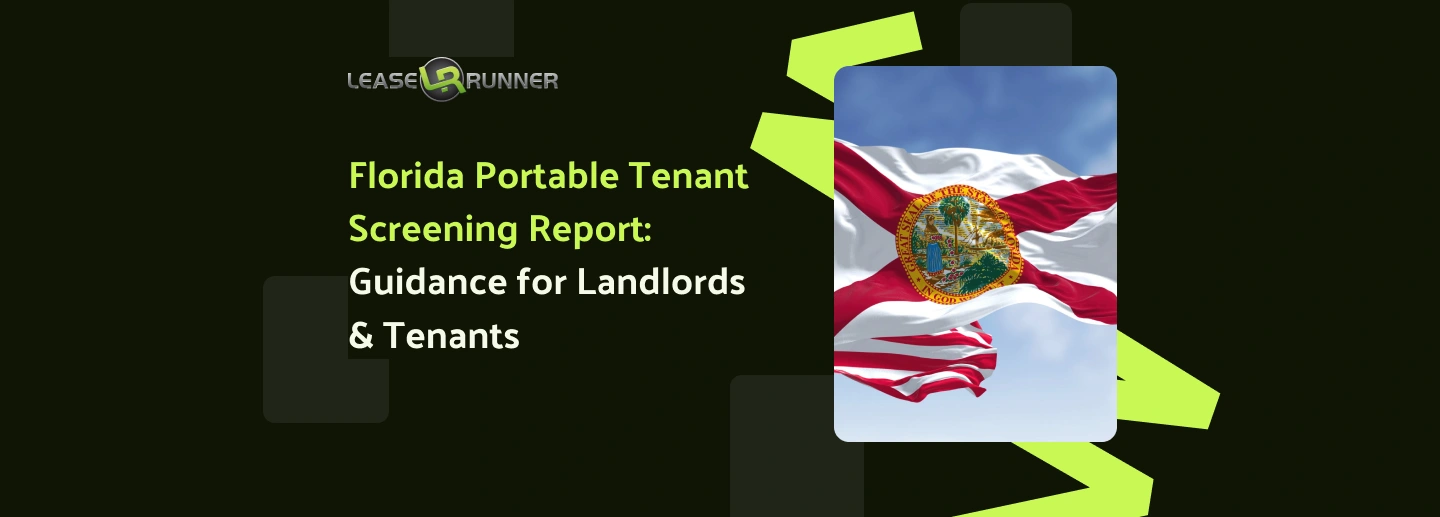
The Illinois portable tenant screening report is changing how renting works in 2025. Renters can now reuse one report instead of paying over and over. This guide will show you how to use the Illinois portable tenant screening report to save money and avoid common mistakes.
A Quick Overview of Portable Tenant Screening Report (PTSRs)

A portable tenant screening report, or now you can call it a reusable tenant screening report, is a document that shows a renter’s background check, credit history, and rental history. The report can be reused by the tenant for multiple rental applications.
Once a tenant gets a portable screening report from a consumer credit agency or a screening company, they can share the same report with different landlords. This saves renters money because they don’t have to pay for a new background or credit check every time they want to apply somewhere new. Landlords benefit, too, because they get a consistent, verified report and they can spot potential red flags like a bad credit check without needing to run another one themselves.
Recent 2025 Updates to Illinois Tenant Screening Law
Illinois changed some important rules in 2025 about tenant screening reports, especially about portable tenant screening reports (PTSRs). These updates are designed to protect renters from paying the same screening fees over and over.
Section 25 of P.A. 103-840 (under 765 ILCS 705/25): What's Updated?
Section 25 of the Public Act 103-840 is where the Illinois tenant screening law talks about the use of portable tenant screening reports. The 2025 update makes it clear that landlords must accept a tenant’s valid PTSR if it meets all the required rules.
This section also outlines what counts as a valid report, such as how recent it must be and what information it needs to include.
Landlord Requirements When Accepting a PTSR
Landlords have specific rules they must follow.
- Must accept valid PTSR at no cost: Landlords have to accept the tenant’s portable tenant screening report if it meets all the legal criteria, and they can’t charge any fees for doing so.
- Cannot charge fees if the report meets all criteria: If the report includes everything needed, like updated credit info and background checks, landlords can’t make tenants pay extra to get screened again.
- May require tenant affirmation of no material changes: Landlords can ask tenants to confirm that nothing important has changed since the report was created, but they can’t demand a new report without cause.
Tenant Rights Under Illinois Screening Laws
Tenants have more power than ever before under the updated Illinois screening laws. These laws protect renters from extra costs and give them control over their screening reports.
- Reuse PTSR across applications: Tenants have the right to use the same portable tenant screening report for several rental applications, saving time and money.
- No repeated screening fees: Tenants cannot be charged the same screening fee multiple times if they already have a valid report. This stops landlords or companies from making renters pay again and again.
- Right to use consumer credit agency report: Tenants can choose to provide a screening report from a recognized consumer credit agency. Landlords must accept these reports if they meet the legal standards.
What Does the Illinois Portable Tenant Screening Report Include?

The Illinois portable tenant screening report contains key information landlords use to decide if a renter qualifies.
1. Applicant's Identifiers
First up, you’ve got the basics. Things such as full name, birthdate, and contact info. Simple but important.
2. Income Verification
Next, income verification. Landlords want to know if tenants are bringing in enough money to cover rent. This part usually includes pay stubs or proof of income, so they can feel confident that tenants can handle the monthly bills.
3. Last Known Address
Including the tenant’s last known address allows landlords to check rental history and verify previous residences. This detail helps spot potential issues or inconsistencies in the rental application form in Illinois.
4. Eviction History Check
Eviction history is one of the most critical factors landlords examine. A clean eviction record usually strengthens an application, while previous evictions raise red flags that landlords consider carefully.
5. Criminal & Rental History (Optional)
Illinois law requires a portable tenant screening report to include name, contact details, income verification, last known address, and eviction history. However, landlords often expect additional information, like criminal background checks or detailed rental history. To fully replace application screening fees, the report should meet all screening criteria landlords require, even those beyond the law’s minimum standards.
Benefits of Illinois Portable Tenant Screening Reports
The portable tenant screening report changes the rental game by saving money, cutting down paperwork, and speeding up the application process.
For Tenants
- Pay once, use multiple times: Instead of coughing up cash every time you apply somewhere new, you pay once and reuse the same report.
- Reduces application costs: This is a huge win because it stops you from paying screening fees over and over.
- More transparent & faster: You stay in control and speed up your rental applications, which is a relief when you’re hunting for a new place.
For Landlords
For Illinois landlords, Section 25 of P.A. 103-840 actually makes things smoother. It creates a fair and easy way to check tenants without the usual headaches.
- Streamlined screening: Instead of juggling different reports, landlords get one clear, reliable screening that tells the story.
- Lower admin cost: Less paperwork and fewer repeated checks mean landlords save time and money.
- Encourages methodical compliance: And it helps landlords avoid legal trouble by making sure they accept valid portable reports.
How to Get a Portable Tenant Screening Report in Illinois as a Tenant? Step-by-Step

Getting a portable tenant screening report (PTSR) in Illinois might sound tricky, but it’s really a straightforward process.
Step 1. Choose a FCRA‑Compliant Provider (e.g., LeaseRunner)
The first step is to pick a tenant screening company that follows the Fair Credit Reporting Act (FCRA) rules. These rules protect tenant rights and ensure the report is accurate and fair. Companies like LeaseRunner are good examples of FCRA-compliant providers trusted in Illinois.
Step 2: Order & Pay for the Report
Once the provider is chosen, the tenant orders the portable screening report and pays the fee. This is usually done online, and after payment, the provider begins pulling together all the necessary information for the report.
Step 3: Confirm Includes Required Data
Illinois law requires name, contact info, income verification, last known address, and eviction history. However, some landlords also want criminal background checks or detailed rental history. To avoid paying additional fees later, the report should cover all landlord-required checks.
Step 4: Share It Securely (direct or via third-party portal)
After receiving the report, tenants need to share it with landlords or property managers safely. This can be done directly via email or through a third-party portal. For example, with LeaseRunner, tenants will need the property manager’s email address to send the PTSR securely.
Step 5: Confirm No Major Changes Since Issuance
Before landlords finalize decisions, tenants may be asked to confirm that nothing significant has changed since the report was issued, like new debts, evictions, or criminal issues.
Step 6 (Optional): Reuse the PTSR for Multiple Applications
One of the best parts about a portable tenant screening report is its reusability. Tenants can use the same PTSR when applying to several rental properties.
Share your verified screening data with multiple landlords.

Apply Anywhere. Just One Report Needed.
5 Steps For Landlords to Accept a Portable Tenant Screening Report
There are simple 5-step approaches landlords can follow.
Step 1: Request the PTSR from the Tenant
The first step is to ask the tenant to provide their portable tenant screening report. Since tenants pay for these reports upfront, it’s fair for landlords to accept the PTSR instead of requiring a new screening and extra fees.
Step 2: Review the Report for Necessary Information
Landlords should carefully review the report to make sure it contains all the information needed for a proper tenant screening. This involves identifiers, income verification, last known address, eviction history, and any additional checks the landlord requires.
Step 3: Verify the Report’s Validity
Not all reports are created equal. Landlords need to confirm the report comes from an FCRA-compliant provider and that it’s recent and complete. An outdated or incomplete report might not be valid for making rental decisions.
Step 4: Ensure Compliance with Illinois Tenant Screening Laws
Illinois law (P.A. 103-840) clearly states that landlords must accept reusable tenant screening reports if they meet legal requirements. When a valid PTSR is provided, landlords cannot charge an application fee or a tenant screening fee.
Landlords should be aware of all tenant protection laws, including the Fair Housing Act and any local tenant protection laws (especially in cities like Chicago, where extra rules might apply).
Step 5: Make a Final Decision
After verifying and reviewing the PTSR, landlords can make their rental decision. It’s important to consider the report alongside any other relevant factors, such as references or interviews, to ensure a well-rounded evaluation.
Cases When Application Fees Are (and Aren’t) Allowed
Being clear about when tenant screening fees are due keeps the rental process running smoothly.
Case 1: Tenant Doesn’t Provide a PTSR
If a tenant does not provide a portable tenant screening report, landlords are generally allowed to charge an application fee to cover the cost of screening. This fee covers the landlord’s expenses for running credit, eviction, and tenant background checks in Illinois.
Case 2: Tenant Provides an Incomplete PTSR
Sometimes, a tenant provides a PTSR that doesn’t have all the information landlords require. In this case, landlords can charge a partial fee, but only for the additional checks that must be done separately.
Case 3: Tenant Provides a Valid PTSR
When the tenant supplies a valid, complete portable tenant screening report that meets the landlord’s criteria, no application or screening fee can be charged. This encourages tenants to invest in reusable reports and keeps the rental application process in Illinois fair and affordable.
Potential Assumptions About PTSRs and Tips to Avoid

There are quite a few assumptions floating around about portable tenant screening reports (PTSRs) that can trip up both landlords and renters.
Common Landlord Concerns
Some landlords jump to conclusions about PTSRs that don’t always hold up:
- Assuming PTSRs are always current or complete: Just because a report is portable doesn’t mean it’s up-to-date or has every piece of info needed. Always double-check the date and contents before making decisions.
- Not verifying authenticity or changes: Sometimes landlords forget to confirm the report really comes from a trusted source or miss that the tenant’s situation might have changed since the report was issued. A quick verification saves a lot of trouble.
- Expecting integration with internal systems: Landlords sometimes expect the PTSR to plug directly into their own screening software or processes. Since that’s not always possible, having a clear plan to review and accept reports manually is key.
Tip: Take the time to verify reports carefully and set clear expectations with tenants about what’s included.
Common Renter Mistakes
On the renter side, there are some common missteps that cause confusion:
- Thinking a PTSR guarantees approval: A screening report is just one part of the application. Other factors, like landlord preferences or additional checks, can still influence decisions.
- Not checking for errors: Mistakes happen in reports. Tenants should review their PTSR carefully to catch any wrong information before landlords see it.
- Not understanding their fee rights: Some tenants don’t realize when they should or shouldn’t be charged screening fees, especially when providing a valid PTSR. Knowing these rights can save money and avoid disputes.
Tip: Tenants should always double-check their reports and understand their rights around fees before applying.
Conclusion
With the Illinois portable tenant screening report, the rental process takes a big step forward. It cuts unnecessary costs, speeds up approvals, and supports legal protections for tenants. Streamline your rental process with LeaseRunner's easy-to-use tenant screening service!
FAQs
Q1. How do I get a portable tenant screening report?
Getting a portable tenant screening report starts with choosing a provider that follows the Fair Credit Reporting Act (FCRA). Companies like LeaseRunner offer these reports in Illinois. After selecting a provider, tenants order the report online and pay the required fee.
Q2. How to get a portable tenant screening report?
To get a portable tenant screening report, tenants should pick an FCRA-compliant screening company, place an order, and pay the fee. Once received, it can be safely shared with property managers or landlords to avoid paying multiple application fees, which property managers often charge separately for each application.







